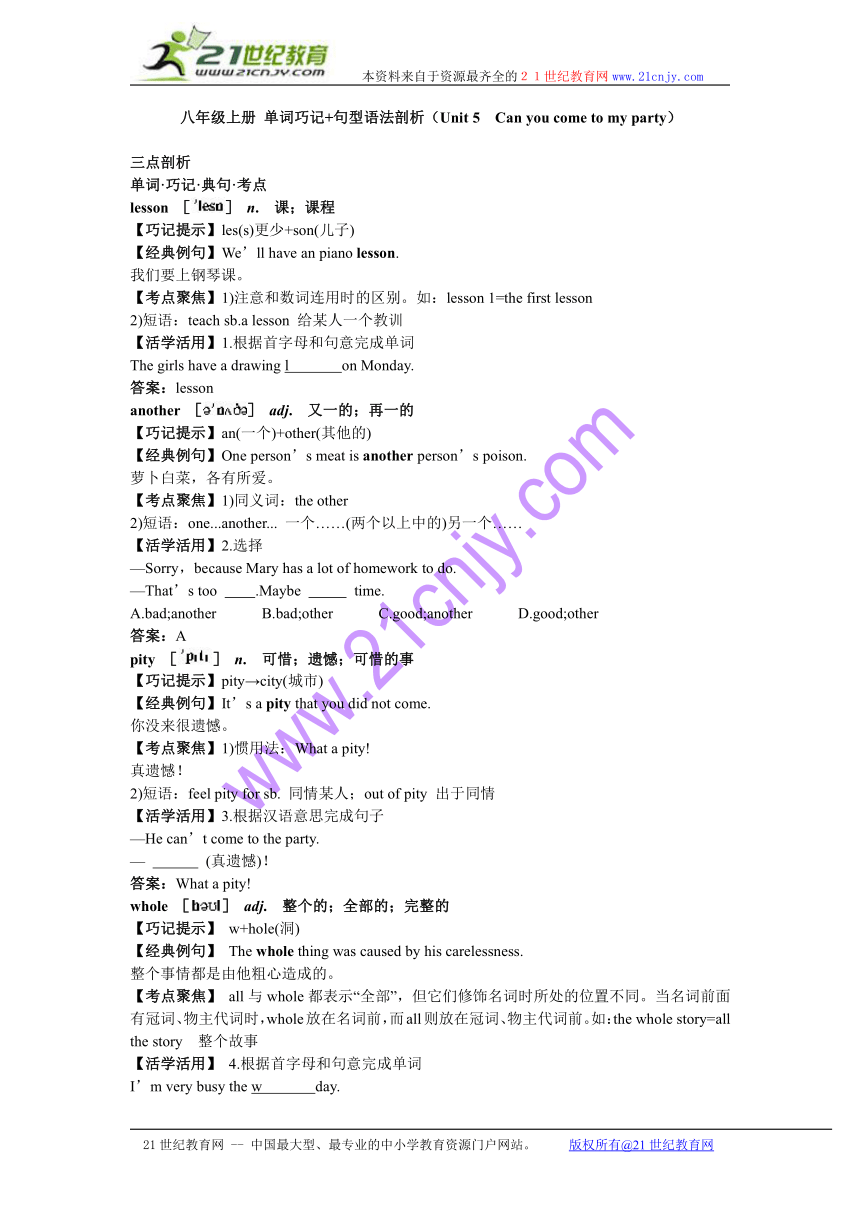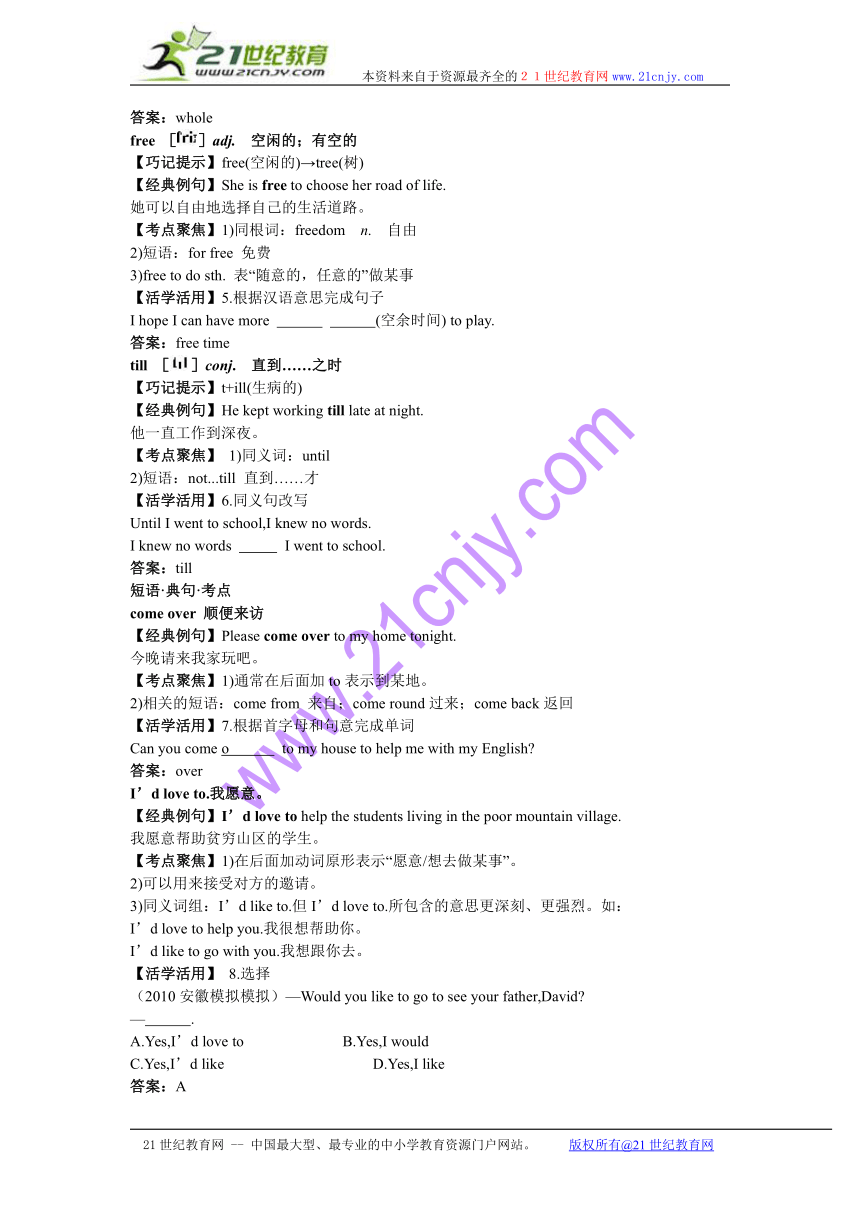Unit 5 Can you come to my party? (单词巧记+句型语法剖析)
文档属性
| 名称 | Unit 5 Can you come to my party? (单词巧记+句型语法剖析) |  | |
| 格式 | rar | ||
| 文件大小 | 368.1KB | ||
| 资源类型 | 教案 | ||
| 版本资源 | 人教新目标(Go for it)版 | ||
| 科目 | 英语 | ||
| 更新时间 | 2011-01-21 16:21:00 | ||
图片预览


文档简介
本资料来自于资源最齐全的21世纪教育网www.21cnjy.com
八年级上册 单词巧记+句型语法剖析(Unit 5 Can you come to my party)
三点剖析
单词·巧记·典句·考点
lesson [] n.?课;课程
【巧记提示】les(s)更少+son(儿子)
【经典例句】We’ll have an piano lesson.
我们要上钢琴课。
【考点聚焦】1)注意和数词连用时的区别。如:lesson 1=the first lesson
2)短语:teach sb.a lesson 给某人一个教训
【活学活用】1.根据首字母和句意完成单词
The girls have a drawing l on Monday.
答案:lesson
another [] adj.?又一的;再一的
【巧记提示】an(一个)+other(其他的)
【经典例句】One person’s meat is another person’s poison.
萝卜白菜,各有所爱。
【考点聚焦】1)同义词:the other
2)短语:one...another... 一个……(两个以上中的)另一个……
【活学活用】2.选择
—Sorry,because Mary has a lot of homework to do.
—That’s too .Maybe time.
A.bad;another B.bad;other C.good;another D.good;other
答案:A
pity [] n.?可惜;遗憾;可惜的事
【巧记提示】pity→city(城市)
【经典例句】It’s a pity that you did not come.
你没来很遗憾。
【考点聚焦】1)惯用法:What a pity!
真遗憾!
2)短语:feel pity for sb. 同情某人;out of pity 出于同情
【活学活用】3.根据汉语意思完成句子
—He can’t come to the party.
— (真遗憾)!
答案:What a pity!
whole [] adj.?整个的;全部的;完整的
【巧记提示】 w+hole(洞)
【经典例句】 The whole thing was caused by his carelessness.
整个事情都是由他粗心造成的。
【考点聚焦】 all与whole都表示“全部”,但它们修饰名词时所处的位置不同。当名词前面有冠词、物主代词时,whole放在名词前,而all则放在冠词、物主代词前。如:the whole story=all the story 整个故事
【活学活用】 4.根据首字母和句意完成单词
I’m very busy the w day.
答案:whole
free []adj.?空闲的;有空的
【巧记提示】free(空闲的)→tree(树)
【经典例句】She is free to choose her road of life.
她可以自由地选择自己的生活道路。
【考点聚焦】1)同根词:freedom n.?自由
2)短语:for free 免费
3)free to do sth. 表“随意的,任意的”做某事
【活学活用】5.根据汉语意思完成句子
I hope I can have more (空余时间) to play.
答案:free time
till []conj.?直到……之时
【巧记提示】t+ill(生病的)
【经典例句】He kept working till late at night.
他一直工作到深夜。
【考点聚焦】 1)同义词:until
2)短语:not...till 直到……才
【活学活用】6.同义句改写
Until I went to school,I knew no words.
I knew no words I went to school.
答案:till
短语·典句·考点
come over 顺便来访
【经典例句】Please come over to my home tonight.
今晚请来我家玩吧。
【考点聚焦】1)通常在后面加to表示到某地。
2)相关的短语:come from 来自;come round过来;come back返回
【活学活用】7.根据首字母和句意完成单词
Can you come o to my house to help me with my English
答案:over
I’d love to.我愿意。
【经典例句】I’d love to help the students living in the poor mountain village.
我愿意帮助贫穷山区的学生。
【考点聚焦】1)在后面加动词原形表示“愿意/想去做某事”。
2)可以用来接受对方的邀请。
3)同义词组:I’d like to.但I’d love to.所包含的意思更深刻、更强烈。如:
I’d love to help you.我很想帮助你。
I’d like to go with you.我想跟你去。
【活学活用】 8.选择
(2010安徽模拟模拟)—Would you like to go to see your father,David
— .
A.Yes,I’d love to B.Yes,I would
C.Yes,I’d like D.Yes,I like
答案:A
have to 不得不
【经典例句】It’s dark,I have to go home.
天黑了,我得回家了。
【考点聚焦】1)have to+动词原形。
2)有人称、时态和数的变化。如:
He has to get up at six.他六点就得起床。
【活学活用】9.选择
(2010淄博模拟模拟)My parents never remember my telephone number,and they always? look it up.
A.must B.can C.should D.have to
答案:D
the day after tomorrow 后天
【经典例句】There will be a match the day after tomorrow.
后天将会有一场比赛。
【考点聚焦】1)该短语前面不加表时间的介词。
2)通常和将来时连用。
【活学活用】10.根据首字母和句意完成单词
They’re going to the cinema the day after t .
答案:tomorrow
the whole day 一整天
【经典例句】I was listening to music the whole day.
一整天我都在听音乐。
【考点聚焦】1)该短语前面不加介词。
2)同义词组:all the day,但要注意whole,all的位置。
【活学活用】11.同义句改写
I go fishing with grandpa the whole day.
I go fishing with grandpa .
答案:all the day
句子·剖析·拓展
A:Can you come to my party on Wednesday
星期三你能来参加我的聚会吗?
B:Sure,I’d love to.当然,我很乐意。
【剖析】1)本句用Can you...来表示邀请;
2)sure在此处表示接受邀请。
【拓展】1)接受邀请经常会说:Sure,I’d love to.
2)委婉的拒绝一般会说:I’m sorry,I can’t,I have to....
I’m sorry,I can’t.I have too much homework this weekend.
对不起,我不能去。因为这周末我有太多的作业要做。
【剖析】 1)I’m sorry,I can’t.用来拒绝邀请;
2)too much修饰后面的不可数名词homework。
【拓展】 too much+不可数名词;too many+可数名词
如:too much water 太多的水;too many balls 太多球
This evening I am going to my cousin’s birthday party.
今晚我要去参加我堂兄的生日晚会。
【剖析】1)本句用be going to do sth.结构来表示按计划安排好的事情。
2)this evening是时间状语,也可放在句尾。
【拓展】my cousin’s birthday party是名词所有格形式。有多种变化形式:
1)-’s型,如:Jim’s brother 吉姆的哥哥
2)-s’型,如:Mothers’ Day 母亲节
3)of型,如:map of world 世界地图
I have to study for my chemistry test on Thursday.
我得为化学考试作准备。
【剖析】1)本句用have to来表示“不得不做某事”。
2)在具体的时间前面要加介词on。
【拓展】have to与must的区别:
关键词 例 句 说 明
have to It is raining today,I have to stay at home.今天下雨了,我不得不待在家里。 have to表示客观需求,“不得不,必须”。
must I must work hard.我必须努力学习。 must表主观要求,“必须”。
Please keep quiet!I’m trying to study.
请安静!我正要学习。
【剖析】 1)这是一个由please+动词原形构成的祈使句;
2)keep+adj.?表示“保持某种状态”。
【拓展】 祈使句表示建议、请求、命令。其特点是省略了主语,以动词原形开头。
1)V型祈使句:以行为动词开头
2)B型祈使句:以Be开头
3)L型祈使句:以Let开头
4)D型祈使句:以Don’t+动词原形开头
语法·剖析
can的用法?
典题精讲
例1We often have sports after class,and I like to play basketball.
A.a B.an C.the D./
思路解析:play与球类名词搭配,中间无需任何冠词。答案:D
绿色通道:加不加冠词、加哪个冠词在英语中有很大差别。需要平时在学习时特别留意。如:in hospital 住院,in the hospital 在医院;in prison 坐牢,in the prison 在监狱里。
例2The twins were born a Friday evening.
A.in B.at C.on D.of
思路解析:在晚上是in the evening,如果指具体的某一天的晚上,就要把介词in换为on。答案:C
黑色陷阱:本题容易错选A项。没有考虑具体的语境,特别需注意的是:在英语中,介词at,on,in 与时间名词连用,表示的范围不同,at+点;on+天,in+星期、月、年和世纪等,由小到大,体现英语国家人的说话习惯。
例3Li Lei can’t go hiking with us today,because he take care of his sick mother.
A.has to B.may C.mustn’t D.needn’t
思路解析:句意为“李雷今天不能与我们一起去远足了,因为他得照顾他生病的母亲”。B项 may意为“可能”;C项 mustn’t表示“不允许、禁止”;D项 needn’t表示“不必”。has to 表示“必须”,而且强调是由于客观原因造成的。答案:A
绿色通道:情态动词在语气上有区别,法则、规定等强制性的行为常用must。情态表示动词的可能性有弱到强的顺序依次为:may例4—Can you come to my birthday party on Sunday
— .When
—At 7:00.Please be on time.
—OK.
A.No,I can’t B.Yes,I like
C.Yes,I’d love to D.Yes,I’d love
思路解析:根据上下文可判断出对方是答应了邀请,所以应用短语I’d love to.我愿意去。注意其中的介词to不可丢掉,这是固定搭配。答案:C
绿色通道:交际用语讲究礼仪。如:拒绝对方的邀请,会委婉地说“I’d love to,but I have to do the chores.”英语国家人非常讲究语言技巧,这一点需要在平时的学习中多加注意,了解英语国家人的文化背景比死记硬背强得多。
巧学法园地
can与could用法歌诀 may与might用法歌诀
can表能力和可以, might表也许或可以,
于否、问句中表猜疑。 要比may更客气。
could是can的过去式, might是may的过去式,
语气比can更客气。 有些时候表猜疑。
21世纪教育网 -- 中国最大型、最专业的中小学教育资源门户网站。 版权所有@21世纪教育网
八年级上册 单词巧记+句型语法剖析(Unit 5 Can you come to my party)
三点剖析
单词·巧记·典句·考点
lesson [] n.?课;课程
【巧记提示】les(s)更少+son(儿子)
【经典例句】We’ll have an piano lesson.
我们要上钢琴课。
【考点聚焦】1)注意和数词连用时的区别。如:lesson 1=the first lesson
2)短语:teach sb.a lesson 给某人一个教训
【活学活用】1.根据首字母和句意完成单词
The girls have a drawing l on Monday.
答案:lesson
another [] adj.?又一的;再一的
【巧记提示】an(一个)+other(其他的)
【经典例句】One person’s meat is another person’s poison.
萝卜白菜,各有所爱。
【考点聚焦】1)同义词:the other
2)短语:one...another... 一个……(两个以上中的)另一个……
【活学活用】2.选择
—Sorry,because Mary has a lot of homework to do.
—That’s too .Maybe time.
A.bad;another B.bad;other C.good;another D.good;other
答案:A
pity [] n.?可惜;遗憾;可惜的事
【巧记提示】pity→city(城市)
【经典例句】It’s a pity that you did not come.
你没来很遗憾。
【考点聚焦】1)惯用法:What a pity!
真遗憾!
2)短语:feel pity for sb. 同情某人;out of pity 出于同情
【活学活用】3.根据汉语意思完成句子
—He can’t come to the party.
— (真遗憾)!
答案:What a pity!
whole [] adj.?整个的;全部的;完整的
【巧记提示】 w+hole(洞)
【经典例句】 The whole thing was caused by his carelessness.
整个事情都是由他粗心造成的。
【考点聚焦】 all与whole都表示“全部”,但它们修饰名词时所处的位置不同。当名词前面有冠词、物主代词时,whole放在名词前,而all则放在冠词、物主代词前。如:the whole story=all the story 整个故事
【活学活用】 4.根据首字母和句意完成单词
I’m very busy the w day.
答案:whole
free []adj.?空闲的;有空的
【巧记提示】free(空闲的)→tree(树)
【经典例句】She is free to choose her road of life.
她可以自由地选择自己的生活道路。
【考点聚焦】1)同根词:freedom n.?自由
2)短语:for free 免费
3)free to do sth. 表“随意的,任意的”做某事
【活学活用】5.根据汉语意思完成句子
I hope I can have more (空余时间) to play.
答案:free time
till []conj.?直到……之时
【巧记提示】t+ill(生病的)
【经典例句】He kept working till late at night.
他一直工作到深夜。
【考点聚焦】 1)同义词:until
2)短语:not...till 直到……才
【活学活用】6.同义句改写
Until I went to school,I knew no words.
I knew no words I went to school.
答案:till
短语·典句·考点
come over 顺便来访
【经典例句】Please come over to my home tonight.
今晚请来我家玩吧。
【考点聚焦】1)通常在后面加to表示到某地。
2)相关的短语:come from 来自;come round过来;come back返回
【活学活用】7.根据首字母和句意完成单词
Can you come o to my house to help me with my English
答案:over
I’d love to.我愿意。
【经典例句】I’d love to help the students living in the poor mountain village.
我愿意帮助贫穷山区的学生。
【考点聚焦】1)在后面加动词原形表示“愿意/想去做某事”。
2)可以用来接受对方的邀请。
3)同义词组:I’d like to.但I’d love to.所包含的意思更深刻、更强烈。如:
I’d love to help you.我很想帮助你。
I’d like to go with you.我想跟你去。
【活学活用】 8.选择
(2010安徽模拟模拟)—Would you like to go to see your father,David
— .
A.Yes,I’d love to B.Yes,I would
C.Yes,I’d like D.Yes,I like
答案:A
have to 不得不
【经典例句】It’s dark,I have to go home.
天黑了,我得回家了。
【考点聚焦】1)have to+动词原形。
2)有人称、时态和数的变化。如:
He has to get up at six.他六点就得起床。
【活学活用】9.选择
(2010淄博模拟模拟)My parents never remember my telephone number,and they always? look it up.
A.must B.can C.should D.have to
答案:D
the day after tomorrow 后天
【经典例句】There will be a match the day after tomorrow.
后天将会有一场比赛。
【考点聚焦】1)该短语前面不加表时间的介词。
2)通常和将来时连用。
【活学活用】10.根据首字母和句意完成单词
They’re going to the cinema the day after t .
答案:tomorrow
the whole day 一整天
【经典例句】I was listening to music the whole day.
一整天我都在听音乐。
【考点聚焦】1)该短语前面不加介词。
2)同义词组:all the day,但要注意whole,all的位置。
【活学活用】11.同义句改写
I go fishing with grandpa the whole day.
I go fishing with grandpa .
答案:all the day
句子·剖析·拓展
A:Can you come to my party on Wednesday
星期三你能来参加我的聚会吗?
B:Sure,I’d love to.当然,我很乐意。
【剖析】1)本句用Can you...来表示邀请;
2)sure在此处表示接受邀请。
【拓展】1)接受邀请经常会说:Sure,I’d love to.
2)委婉的拒绝一般会说:I’m sorry,I can’t,I have to....
I’m sorry,I can’t.I have too much homework this weekend.
对不起,我不能去。因为这周末我有太多的作业要做。
【剖析】 1)I’m sorry,I can’t.用来拒绝邀请;
2)too much修饰后面的不可数名词homework。
【拓展】 too much+不可数名词;too many+可数名词
如:too much water 太多的水;too many balls 太多球
This evening I am going to my cousin’s birthday party.
今晚我要去参加我堂兄的生日晚会。
【剖析】1)本句用be going to do sth.结构来表示按计划安排好的事情。
2)this evening是时间状语,也可放在句尾。
【拓展】my cousin’s birthday party是名词所有格形式。有多种变化形式:
1)-’s型,如:Jim’s brother 吉姆的哥哥
2)-s’型,如:Mothers’ Day 母亲节
3)of型,如:map of world 世界地图
I have to study for my chemistry test on Thursday.
我得为化学考试作准备。
【剖析】1)本句用have to来表示“不得不做某事”。
2)在具体的时间前面要加介词on。
【拓展】have to与must的区别:
关键词 例 句 说 明
have to It is raining today,I have to stay at home.今天下雨了,我不得不待在家里。 have to表示客观需求,“不得不,必须”。
must I must work hard.我必须努力学习。 must表主观要求,“必须”。
Please keep quiet!I’m trying to study.
请安静!我正要学习。
【剖析】 1)这是一个由please+动词原形构成的祈使句;
2)keep+adj.?表示“保持某种状态”。
【拓展】 祈使句表示建议、请求、命令。其特点是省略了主语,以动词原形开头。
1)V型祈使句:以行为动词开头
2)B型祈使句:以Be开头
3)L型祈使句:以Let开头
4)D型祈使句:以Don’t+动词原形开头
语法·剖析
can的用法?
典题精讲
例1We often have sports after class,and I like to play basketball.
A.a B.an C.the D./
思路解析:play与球类名词搭配,中间无需任何冠词。答案:D
绿色通道:加不加冠词、加哪个冠词在英语中有很大差别。需要平时在学习时特别留意。如:in hospital 住院,in the hospital 在医院;in prison 坐牢,in the prison 在监狱里。
例2The twins were born a Friday evening.
A.in B.at C.on D.of
思路解析:在晚上是in the evening,如果指具体的某一天的晚上,就要把介词in换为on。答案:C
黑色陷阱:本题容易错选A项。没有考虑具体的语境,特别需注意的是:在英语中,介词at,on,in 与时间名词连用,表示的范围不同,at+点;on+天,in+星期、月、年和世纪等,由小到大,体现英语国家人的说话习惯。
例3Li Lei can’t go hiking with us today,because he take care of his sick mother.
A.has to B.may C.mustn’t D.needn’t
思路解析:句意为“李雷今天不能与我们一起去远足了,因为他得照顾他生病的母亲”。B项 may意为“可能”;C项 mustn’t表示“不允许、禁止”;D项 needn’t表示“不必”。has to 表示“必须”,而且强调是由于客观原因造成的。答案:A
绿色通道:情态动词在语气上有区别,法则、规定等强制性的行为常用must。情态表示动词的可能性有弱到强的顺序依次为:may
— .When
—At 7:00.Please be on time.
—OK.
A.No,I can’t B.Yes,I like
C.Yes,I’d love to D.Yes,I’d love
思路解析:根据上下文可判断出对方是答应了邀请,所以应用短语I’d love to.我愿意去。注意其中的介词to不可丢掉,这是固定搭配。答案:C
绿色通道:交际用语讲究礼仪。如:拒绝对方的邀请,会委婉地说“I’d love to,but I have to do the chores.”英语国家人非常讲究语言技巧,这一点需要在平时的学习中多加注意,了解英语国家人的文化背景比死记硬背强得多。
巧学法园地
can与could用法歌诀 may与might用法歌诀
can表能力和可以, might表也许或可以,
于否、问句中表猜疑。 要比may更客气。
could是can的过去式, might是may的过去式,
语气比can更客气。 有些时候表猜疑。
21世纪教育网 -- 中国最大型、最专业的中小学教育资源门户网站。 版权所有@21世纪教育网
同课章节目录
- Unit 1 Where did you go on vacation?
- Section A
- Section B
- Unit 2 How often do you exercise?
- Section A
- Section B
- Unit 3 I'm more outgoing than my sister.
- Section A
- Section B
- Unit 4 What's the best movie theater?
- Section A
- Section B
- Unit 5 Do you want to watch a game show?
- Section A
- Section B
- Unit 6 I'm going to study computer science.
- Section A
- Section B
- Unit 7 Will people have robots?
- Section A
- Section B
- Unit 8 How do you make a banana milk shake?
- Section A
- Section B
- Unit 9 Can you come to my party?
- Section A
- Section B
- Unit 10 If you go to the party, you'll have a grea
- Section A
- Section B
